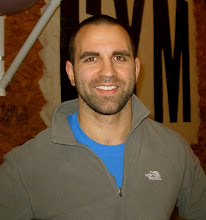For some reason "I don't know" doesn't really work ("you don't say"-sarcam). So I get questioned on Oly lifts, power lifitng, kettlebells/Dumbbells/Barbells, plyos, corrective exercise, endurance, static/dynamic stretching, etc. It's slightly exhausting to even try to label myself. To be honest, no I don't.
Personally, I don't adhere to one principle of anything.
I'm not all powerlifting, all kettlebell, all olympic lifting, all movement based training, all barbell, all endurance, strength or speed.
I'm down w/ what works for the given situation we're presented w/, and if I figure out a better/more efficient way to do something that gets the results I want in the same/less time then I'm going to use it.
I say, let's get our bodies as efficient as possible in the most efficient way possible.
I'm looking for COMPLETE.
Not just barbells or kettlebells, movement or powerlifting. I think pretty much everything works (as long as it's quantifiably testable, somehow backed w/ well put together, collected, and provable data that's also logical), so I take the best pieces of all of them, w/ the assessment and goal and make a program based off of this for that individual. This brings us closer to COMPLETE.
Do I think we are able to create COMPLETE programs in order to create the most COMPLETE MUTANTS out there? No, not yet, otherwise records wouldn't be getting smashed year after year (Usain Bolt=MUTANT) There is no way that this is simply due to talent.
Do I think the potential to make some real freaks out of mediocre athletes is possible? YOU BET.
Do I think the potential exists to ruin incredibly talented athlete's? Yep, and it's really not all that difficult.
I agree w/:
- The 5 senses: hearing, taste, touch, sight, smell.
- Moving heavy weight, and the carry over to speed from that.
- Moving lighter weight w/ more speed. (This includes oly lifts when they are appropriate h/e I would still classify them as more of a skill than an exercise and I don't use them much due to a comparatively long learning curve.)
- here I'm really referring to jumping w/ weight in hand, and challenging lesser weight w/ more speed in a lift like the bench press.
- Plyometrics (in logically adjusted volumes)
- Unilateral and bilateral training
- Psychology: Visualization (it's not hocus pocus, it's building confidence and belief), Discipline, Struggle, Focus, etc. They have a place.
- Nutrition and that POOP is a direct indicator of health
- Soft tissue work: SMR, ART, Graston, TFM, etc. They all work.
- Barbells, dumbbells and kettlebells all have their uses and eliminating one entirely is going to drastically reduce progress.
- Eccentrics, Isometrics and concentric exercises? Yep, and not all, always altogether (but almost always)
- Corrective exercise w/o doubt has it's place
- Breathing techniques? Yep those too (a lot)
- The body works as a whole, not in pieces
- Packing the neck is just as important as bracing the trunk
- Pushing sleds completely changes the game
- Test and retest is a must
- The Assessment guides everything, but w/o critical thought and a trained eye it's still a guess.
- etc....
It's NOT about using one or two different principles/implements. It's doing an assessment (everyone has overwhelmingly different needs) and drawing from your tool box to make a program.
In the end, I have no idea what my philosophy would be other than
"I use what I know that works to get closer to complete", and that's that.


No comments:
Post a Comment